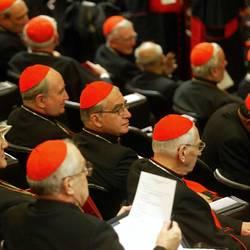" Responsible Seminarists against Paedophilia and Other Deviant Behaviours"
By Andrés Beltramo Álvarez
Interview with the Auxiliary bishop of Papantla (Mexico) attending the symposium against paedophilia at the Gregorian University Healthy and responsible seminarists, this has to be the objective of anyone forming future Catholic priests. This in not only for the good of the Church, but a preventive measure against the calamity that is paedophilia together with other psychological deviations that may affect some clerics. Jorge Patrón Wong, expert of priestly education is sure of this. But can such goal be reached? He explained to the Vatican Insider how it could be done. The Auxiliary bishop of Papantla (Mexico) has been elected as one of the speakers in the Symposium "Towards healing and renovation", which will take place at the Pontifical Gregorian University from the 6th to the 9th of February. This is a symposium for the representatives of the Episcopal Conferences and the Father-Superiors of religious orders worldwide. The meet has one main aim, to help put in place national schemes to fight paedophilia within the clergy. Patrón Wong has not been chosen by chance. Psychologist at the Gregorian University, he has been educating priests for 16 years. He was in charge for ten years of the seminary in Yucatan (Mexico) and was the president of the Organization of Mexican Seminaries (Osmex) and the Organization of Latin American Seminaries (Oslam). In the interview, the bishop said that the first signs of a pathology that may lead to paedophilia can be detected as early as when people are attending seminary, he also recognized that psychology could help the educators of new priests, but he was also very direct: seminarists with emotional issues need to leave and seek treatment outside the seminary. What are the main challenges in the emotional education of future priests today? There are many practical challenges, but one main goal, to achieve the full and healthy development of each young man. Thus his intelligence, will and emotional life will be harmonious and connected in a way that will allow him a consistent and happy life according to the great human and Christian ideals donated to him by God. From a vocational point of view, the seminary emotional education aims at giving young men an urge to love God and their brothers with all their hearts, souls and strength, in other words to feel completely revealed in the love of God. This way each of them can build a life which is a gift to others. How did the education in the seminaries change after the scandal of the children who had been sexually-abused by priests? In the last 10 years I have witnessed closely how the Organization of Latin American Seminaries (Oslam) and the Organization of Mexican seminaries (Osmex) daily offer support and skill sets to seminary educators in the human, psychological, spiritual, pastoral and intellectual fields In South American seminaries there have been great achievements in the vocational accompaniment and the learning stages have been extended. There are clear principles and real assessment tools, a sense of spiritual communion and participation with modern society, as well as great care and importance being placed on the human and spiritual dimension of each person. Can the pathological problems which could lead to paedophilia be identified as early as when someone attends the seminary? How? The signs of pathology can be identified through a close vocational accompaniment and by being perceptive. Vocational accompaniment and attention are also, and especially, the tools used to detect the signs and spiritual, human, psychological, intellectual and apostolic qualities of a future priest . These like seeds (this is why seminaries bear that name) are found within a young man and make him suited to answer the transcendental call of the vocation to priesthood. People with signs of pathologies must be psychologically helped and spiritually guided, but this must happen outside the seminary as these people need to achieve normality in a wider context. The work of the seminaries is for normal young men who are in various stages of growth and maturity and it is aimed at helping them grow those seeds of goodness, generosity and self sacrifice they have within. Selection and education are the fundamental duties of seminaries. How can psychology help? Psychology (a science of human assistance ) can be of great help and offer indications and pedagogical tools to facilitate the selection and education of future priests. Psychology is a very useful science that can add to one's development and also the development of a community, but the most important decisions must be left to spiritual awareness and vocational accompaniment. How can the Church guarantee that the past dramatic cases of paedophilia in the clergy won't occur again? The constant update of selection methods and of the criteria by which the candidates are educated, the creation of learning paths that gradually integrate all spiritual, human, emotional and pastoral aspects of each person and of the group, coupled with the continual training of the educators, are tools that give us trust in the task of forming healthy and responsible young men, future priests that may be holy and wise in their service to society.
|
.
Any original material on these pages is copyright © BishopAccountability.org 2004. Reproduce freely with attribution.
